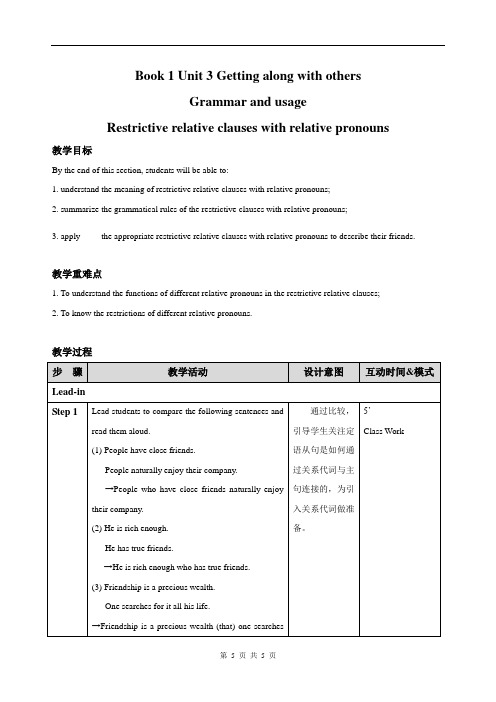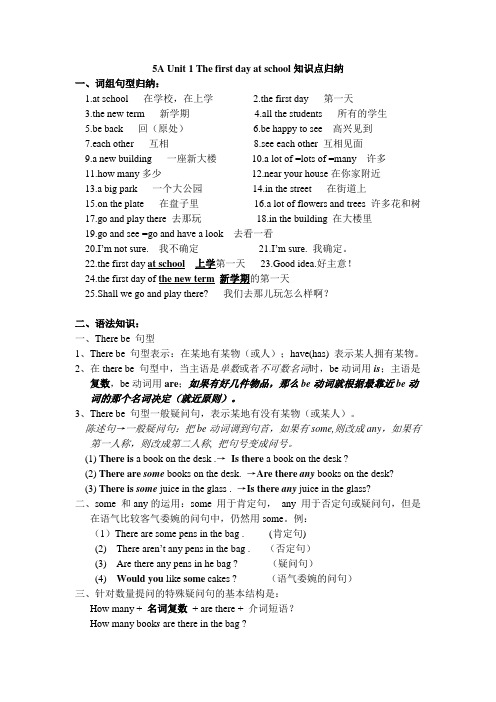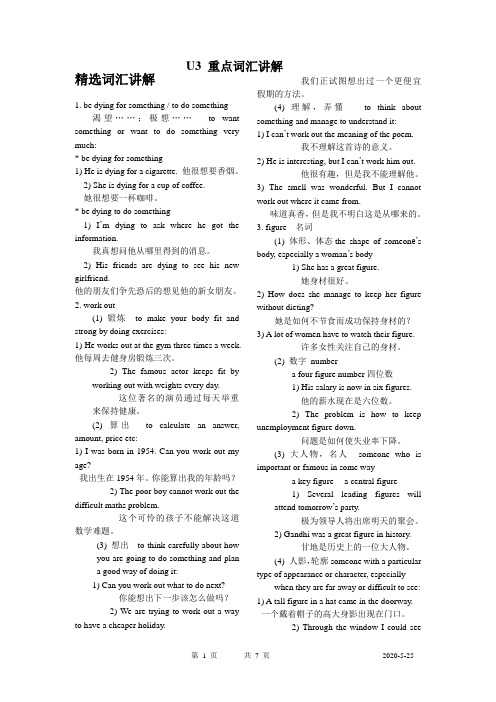Book 1_U3_语法
- 格式:doc
- 大小:85.00 KB
- 文档页数:5

Book 1 Unit 3 Getting along with othersGrammar and usageRestrictive relative clauses with relative pronouns教学目标By the end of this section, students will be able to:1. understand the meaning of restrictive relative clauses with relative pronouns;2. summarize the grammatical rules of the restrictive clauses with relative pronouns;3. apply the appropriate restrictive relative clauses with relative pronouns to describe their friends.教学重难点1. To understand the functions of different relative pronouns in the restrictive relative clauses;2. To know the restrictions of different relative pronouns.教学过程步骤教学活动设计意图互动时间&模式Lead-inStep 1 Lead students to compare the following sentences and read them aloud.(1) People have close friends.People naturally enjoy their company.→People who have close friends naturally enjoy their company.(2) He is rich enough.He has true friends.→He is rich enough who has true friends.(3) Friendship is a precious wealth.One searches for it all his life.→Friendship is a precious wealth (that) one searches通过比较,引导学生关注定语从句是如何通过关系代词与主句连接的,为引入关系代词做准备。

5A Unit 1 The first day at school知识点归纳一、词组句型归纳:1.at school 在学校,在上学2.the first day 第一天3.the new term 新学期4.all the students 所有的学生5.be back 回(原处)6.be happy to see 高兴见到7.each other 互相8.see each other 互相见面9.a new building 一座新大楼10.a lot of =lots of =many 许多11.how many多少12.near your house在你家附近13.a big park 一个大公园14.in the street 在街道上15.on the plate 在盘子里16.a lot of flowers and trees 许多花和树17.go and play there 去那玩18.in the building 在大楼里19.go and see =go and have a look 去看一看20.I’m not sure. 我不确定21.I’m sure. 我确定。
22.the first day at school上学第一天23.Good idea.好主意!24.the first day of the new term新学期的第一天25.Shall we go and play there? 我们去那儿玩怎么样啊?二、语法知识:一、There be 句型1、There be 句型表示:在某地有某物(或人);have(has) 表示某人拥有某物。
2、在there be 句型中,当主语是单数或者不可数名词时,be动词用is;主语是复数,be动词用are;如果有好几件物品,那么be动词就根据最靠近be动词的那个名词决定(就近原则)。
3、There be 句型一般疑问句,表示某地有没有某物(或某人)。


U3 重点词汇讲解精选词汇讲解1. be dying for something / to do something渴望……;极想……to want something or want to do something very much:* be dying for something1) He is dying for a cigarette. 他很想要香烟。
2) She is dying for a cup of coffee.她很想要一杯咖啡。
* be dying to do something1) I’m dying to ask where he got the information.我真想问他从哪里得到的消息。
2) His friends are dying to see his new girlfriend.他的朋友们争先恐后的想见他的新女朋友。
2. work out(1) 锻炼to make your body fit and strong by doing exercises:1) He works out at the gym three times a week. 他每周去健身房锻炼三次。
2) The famous actor keeps fit byworking out with weights every day.这位著名的演员通过每天举重来保持健康。
(2) 算出to calculate an answer, amount, price etc:1) I was born in 1954. Can you work out my age?我出生在1954年。
你能算出我的年龄吗?2) The poor boy cannot work out the difficult maths problem.这个可怜的孩子不能解决这道数学难题。
(3) 想出to think carefully about howyou are going to do something and plana good way of doing it:1) Can you work out what to do next?你能想出下一步该怎么做吗?2) We are trying to work out a way to have a cheaper holiday.我们正试图想出过一个更便宜假期的方法。

U1-U3重点句型,语法,短语总结Unit1 How do you study for a test?一.句型1. by+doing 通过…方式Eg. How do you study for a test?I study by working with a group.2. 现在完成时:常与表示“从过去某一时刻延续到现在的一段时间状语”连用;译为“已经,曾经,…过,了”等。
标志词: since+过去时间点;for+时间段。
Ever(曾经), never (从未), already(已经,否定yet), so far (至今为止)。
结构: have/has +done句型转换: 改变have, has.3. 动名词做主语/宾语Eg. I think that doing lots of listening practice is one of the secrets of becoming a good language learner.He finds watching movies frustrating because people speak too quickly. 二.语法end up/begin with +doing 以…开始/结束eg. End up speaking in Chinesethe best way to do sthEg. This week we asked students about the best way to learn more English.ask sb for help 向某人求助decide to do sth 决定做某事不定式做后置定语,注意介词with不能省I don’t have a partner to practice English with5. 形式主语It be adj +(for sb) to do sth (真主)Eg. It wasn’t easy for me to understand the teacher when she talked.sb be impressed (by…) 被留下深刻印象eg My teacher is very impressed.have trouble/difficulty/a hard time/a good time/fun +doing stheg. She had trouble making complete sentence.look sth up in a dictionary 在字典中查…Not at allunless=if not…:如果不;除非eg. Unless we (If we don’t) deal with our problems, we can easily become unhappy. regard… as 把…当做…eg We can deal with our problems by regarding them as challenges.try one’s best to do sth 尽某人最大努力去做某事eg. It is our duty to try our best to deal with each challenge in our education with the help of our teachers.compare…to (with)… 把…和…作比较eg. You can compare yourself to other peoole.三.词组by making flashcards通过做单词抽认卡; by making vocabulary list; by listening totapes; by reading the textbook; by asking the teacher for help; by watching English-language videos; by practicing conversation with friends; by reading aloud to practice pronunciationkeep an English notebook / take notes记英语笔记/记笔记read aloud 朗读that way (=in that way) 通过那种方式improve my speaking skills提高我的会话技巧have conversations with friends与朋友对话get excited 高兴,激动do/make a survey about… 做有关…的调查spoken English (= oral English) 英语口语make mistakes in sth在…犯错误get the pronunciation right 使发音准确get a lot of /much writing practice 得到大量写作练习first of all/at first 首先later on 随后write down 写下,记下make up conversations 编写对话all over/around the world 全世界deal with 对待,处理,解决worry about (be worried about) 担心,担忧be angry with / be mad at生某人的气; be/stay/keep angry 生气go by 消逝 Time goes by. 时光飞逝complain about/of 抱怨…with the help of 在…的帮助下change…into… 把…变成… (= turn into)face the challenges 面对挑战break off a friendship中断一场友谊Unit 2 I used to be afraid of the dark.一.句型1. used to + do/be 过去常常… 否定:didn’t use to; don’t use to 疑问:did…use toEg. You used to be short, didn’t you?be/get used to doing 习惯于…eg. I used to traveling by air.2. in(during) the last(past) few years 在过去的几年里, 用于现在完成时Eg. My life has changed a lot in the last few years.3. not …anymore=no more not…any longer=no longerEg. I don’t have time anymore.= I no more have time.4. seem + adj / to do/ that(从句)It (必须it作主语)seems that she has changed a lot.She seems (like) to have changed a lot.5. pride(n)/proud(adj)A is proud of B= A takes pride in B: A以B为骄傲B is the proud of A: B 是A 的骄傲Eg. Her daughter is the proud of her.She is proud of/takes pride in her daughter.6. 感叹句How+ adj + 主语+谓语!eg. How beautiful she is!What + n + 主语+谓语! What a beautiful girl she is!二.语法with …on/offEg. I go to sleep with my bedroom light on.be afraid of = be terrified of= be afraid to doEg. I used to be afraid of going outside at night.spend/takeafford to do sth 能够负担起…eg. His mother couldn’t afford to pay for her child’s education. patient: be patient with sb 对…有耐心even though, even if:即使…让步状语从句(有时遵循主将从现)eg. Even though/if it rains, he will go to school.三.词组be more interested in 对…更感兴趣.on the swim team 游泳队的队员.worry about. 担心in the past 在过去(过去式)all the time 一直, 总是chat with 与…闲聊hardly ever 几乎从不,很少(表否定)stressed out 紧张,压力大head teacher 校长cause/make a lot of trouble 制造许多麻烦get into trouble with 与…遇到麻烦make a (difficult) decision 做出决定to one’s surprise 使某人吃惊的是to do this 为了做到这一点(常做状语)as well as one can 尽可能的做好pay attention to 留心, 注意consist of 由…组成/构成.instead of 代替, 而不是in the end; at last; finally最后, 终于give up doing sth 放弃做某事feel good about oneself 觉得很棒daily life 日常生活Unit 3 Teenagers should be allowed to choose their own clothes. 句型被动语态: sth be +done by sbeg. Football is played by people in most countries.含有情态动词的被动语态should/can(not) + be doneeg. Teenagers should be allowed to choose their own clothes.instead, instead of 代替,而不是eg: They are not studying. They are chatting with each other instead.They are chatting with each other instead of studying.so +be/助动词/情态动词(取决于上句的谓语动词,单复数取决于后面的主语)+另一主语表“也是如此”。

单元语法全解一、一般现在时1.谓语动词构成:do/does2.表达意义:(1)表示经常性、习惯性的动作或状态。
He always goes to work by subway.他总是乘地铁去上班。
(2)表示客观真理或用于格言中。
The sun rises in the east and sets in the west.太阳从东方升起,在西方落下。
Light travels faster than sound.光比声音传播快。
(3)表示主语现在的特征或状态。
Jenny loves music.珍妮喜欢音乐。
We are in Class One, Grade Two.我们在二年级一班。
(4)按时间表、时刻表、日程表等安排将要发生的动作,用一般现在时。
这种安排往往不可更改或不能随意变动。
动词(短语)一般表示“开始;结束;到达;离开;起飞;开幕;举行;停止”等意义。
例如begin, start, end, arrive, leave,take off, open, hold, close, stop 等。
The shop closes at 11:00 p. m. today.这家商店今天晚上11点关门。
3.常见的时间状语:always, usually, often, every day, once a week, some-times, at times, from time to time, occasionally, seldom,never, nowadays, today 等。
4.常使用的固定句式:在时间状语从句、条件状语从句中,常常用一般现在时表将来。
I don't know when she will come. When she comes, please tell her the good news.我不知道她什么时候会来。
她来时请告诉她这个好消息。
二、现在进行时1.谓语动词构成:is/am/are doing2.表达意义:(1)表示说话时正在进行的动作,即此时此刻正在进行的动作。
Unit 1 Man and NatureText A Man in the Realm of Nature6. Study of the TextDifficult Sentences1. We are connected with nature by “blood ties” and we cannot live outside nature.(1) What does “blood ties” refer to?A: It refers to such very close relationship as kinship.(2) Translate the sentence.T: 我们与大自然血肉相连,离开大自然,我们将无法生存。
2. Humanity converts nature’s wealth into the means of the cultural, historical life of society. Q: Translate the sentence.T: 人类把自然资源转变为各种文化和社会历史的财富。
3. Not only has man transferred various species of plants and animals to different climatic conditions, he has also changed the shape and climate of his environment and transformed plants and animals.(1) Analyze the structure of this sentence.A: This is a compound sentence led by “not only… (but) also”. The first half led by “not only” is the inverted structure.More examples:Not only is Tom very clever, he is also very diligent.Not only did he lose his bag, but he himself got lost.Not only does he write the lyrics to the songs, but he also composes the music.(2) Paraphrase this sentence.A: Man has shifted different kinds of plants and animals to areas with different climates from those of their original habitats. Moreover, man has transformed the shape and climate of his own environment and accordingly the plants and animals have also adapted themselves to the changes.4. Nature with its elemental forces was regarded as something hostile to man.(1) What can we learn from this sentence?A: We can learn that the power of nature is out of man’s control so that it is believed to be unfavorable to humanity.(2) Translate this sentence into Chinese.T: 大自然及其威力被看成是和人类敌对的东西。
苏教版八年级上册英语语法知识点u3苏教版八年级上册英语语法知识点U3主要包括时态、语气、句型转换这三个方面的内容。
一、时态时态是英语语法中重要的基础知识点,掌握好时态对于学好英语非常关键。
在U3中,我们主要学习了以下几种时态:1. 一般现在时一般现在时表示现在正在进行的事情或经常性的动作。
例如:I usually go to school by bike. 我通常骑自行车去上学。
2. 一般过去时一般过去时表示在过去某个时间发生的事情或者经常性的动作。
例如:I watched TV last night. 我昨晚看电视了。
3. 将来时将来时表示将来会发生的事情。
例如:I will go to Beijing next week. 我下周会去北京。
以上只是时态中的一部分,英语中还有其他的时态,掌握好基础的时态知识有助于学习更高级的时态。
二、语气语气是指说话人表达态度、感情的方式。
U3中,我们主要学习到了以下几种语气:1. 陈述语气陈述语气表示说话人在陈述一个事实或者说话人对事情的看法。
例如:He is a good student. 他是一个好学生。
2. 疑问语气疑问语气表示说话人对某个事情持怀疑的态度或者正在询问对方。
例如:Do you like pizza? 你喜欢披萨吗?3. 祈使语气祈使语气表示说话人对听话人发出命令、请求或者建议。
例如:Please bring me a glass of water. 请给我拿杯水。
以上只是语气中的一部分,英语中还有其他的语气,掌握好各种语气的用法可以让我们更好的表达自己的意思。
三、句型转换在U3中,我们还学习了一些句型转换。
句型转换是指在语法结构、词语、语言习惯等方面进行变换的过程,常见的句型转换包括:1. 变一般句为否定句或疑问句例如:She sings well. → She doesn't sing well.Do you like coffee? → Don't you like coffee?2. 变陈述句为祈使句例如:She speaks English fluently. → Speak English fluently.3. 变复合句为简单句例如:Because it's raining, I can't go out. → I can't go out because it's raining.以上只是句型转换中的一部分,掌握好各种句型转换的方法可以提高我们的语言表达能力。
九年级上册英语U3语法知识点近几年来,英语在中国的教育体系中占据着愈发重要的地位。
随着教材的更新换代,九年级上册的英语教材中U3单元的语法知识点有着不可忽视的作用。
在这篇文章中,我们将一起深入探讨这些语法知识点,掌握它们的用法和应用。
1. 直接引语和间接引语当我们在转述别人的话时,可以使用直接引语或间接引语。
直接引语指的是直接引用别人的原话,使用引号包围;而间接引语则是将别人的话进行转述。
在英语中,使用间接引语时需要注意动词的时态和人称的变化。
例如,当别人说:"I love English."(我喜欢英语)时,我们可以用直接引语直接转述:"I love English." 或者用间接引语进行转述,变为"She said that she loved English."(她说她喜欢英语)。
2. 定语从句定语从句用来修饰一个名词,提供更多的描述信息。
在定语从句中,关系代词和关系副词起着重要的作用。
关系代词有who, whom, whose, which 和that;关系副词有where, when 和 why。
例如,在句子"The book that I borrowed from the library is very interesting."(我从图书馆借到的那本书非常有趣)中,"that I borrowed from the library"是一个定语从句,修饰名词"book"。
而在句子"The city where I was born is famous for its beautiful scenery."(我出生的城市以其美丽的风景而闻名)中,"where I was born"是一个定语从句,修饰名词"city"。
定语从句(三)
【复习】用who, whom, whose, that, which, when, where, why 填空
1.The man ______ is shaking hands with my father is a policeman
2. Li Ming is just the boy _______ I want to see.
3. The house _______ we live is not big.
4. The film __________they went to see last night was not interesting at all.
5. I visited a scientist _______ name is known all over the country.
6. Do you like the book ________ cover is yellow?
7. I still remember the day _______ I first came to this school.
8. I visited the farm ________a lot of cows were raised .
9. Please tell me the reason _____ you missed the plane.
10. I will never forget the days ____________ we spent together.
非限制性定语从句: 前面往往有逗号隔开,如果把非限制性定语从句放在句子中间,其前后都要用逗号与主句隔开。
一、引导非限制性定语从句的关系代词与限制性定语从句基本相似
【注意】1. 关系代词that不能引导非限制性定语从句。
e.g. The book that/which the man is taking about is written by Charles Dickens
The book, which the man is taking about, is written by Charles Dickens
2. 非限制性定语从句中的关系代词不能省略
e.g. The girl (who/whom/that) you met yesterday on the street is my sister.
The girl, who you met yesterday on the street, is my sister.
二、运用非限制性定语从句的情况
1. 关系代词which指代整个主句内容。
e.g. 1) Our new house has a lovely garden, which makes us very happy.
2) T hey couldn’t lead a peaceful life at that moment, which made all the people in the world worried.
3) He failed in the final exam, _____ made his father very angry.
4) She came back to China, _____surprised me a lot.
5) The result turned out to be good, _______we hadn’t expected.
2. 非限制性定语从句中,常用some/ many/ a few /a little/ most/ 数词/形容词最高级+ of
which, whom等结构指代主句的部分。
e.g. 1)You’ve made many mistakes, most of which were due to your carelessness.
2)The teaching buildings, many of which were not strong enough, fell down.
3)Many people, some of whom are not overweight, are going on diets.
4) China has hundreds of islands, the largest of which is Taiwan.
反意疑问句
一、基本用法与结构
He is very smart, isn’t he?【肯定的陈述句+否定的附加疑问句】The bell isn’t ringing, is it?【否定的陈述句+肯定的附加疑问句】Le t’s begin our class, shall we?【祈使句+附加疑问句】
二、反意疑问句的用法:
【练习】完成以下反义疑问句
1.It must have just rained, _________?
2.It must have rained yesterday, __________?
3.The car has hardly been cleaned for a few days,_______?
4.Only lazy people say they’ll work tomorrow, _____________?
5.I think they’ll work tomorrow,______________?
6.I suppose you’re going today, ______
7.They have to study a lot, ____?
8.Clean it now,_________?
9.Let us clean it now, ___________?
10.Don’t clean it now,____________?
11.Let’s clean it now,__________________?
12.There is something wrong with your watch, _____________?
13.Walking is good for our health, ______________________?
14.Learning how to repair computers takes a long time,______________?
15.Everything starts to grow in Spring, ____________?
16.You must study hard to improve your English, _______________?
17.We mustn’t smoke, ____________
18.I wish to have a chance to go abroad, ___________?
19.I think you should study hard, _______________?
20.I don’t suppose anyone will come here______________?
21.Go with me, ___________?
22.Don’t fight with you parents, ____________?
23.How hard he works, _________?
24.Their father has a new car, and they clean it for him, _____________?
25.It must have just rained, and the car is very dirty, __________________?
26.I'm sure dirty, ______
27.You had some trouble finding where I live, ______?
28.I don't think you judged your ability objectively when you applied for it, ______?
29.There appeared to be no better way, _______
30.Tom has been writing letters all afternoon, but he should have finished them by
now, _____?
1.hasn’t it
2.didn’t
3. has it
4. don’t they
5. w on’t they
6. aren’t you
7. don’t they 8. will you 9. will you 10. will you 11. shall we 12. isn’t there 13. isn’t it 14. doesn’t it 15. Doesn’t it 16. mustn’t you/needn’t you
17 must we 18 may I 19. Shouldn’t you 20. Won’t they/ won’t he
21, will you/ won’t you 22, will you 23. Doesn’t he 24. don’t they
25. isn’t it 26. Aren’t I 27. didn't you 28. Didn’t you 29. Didn’t there 30.shouldn't he。